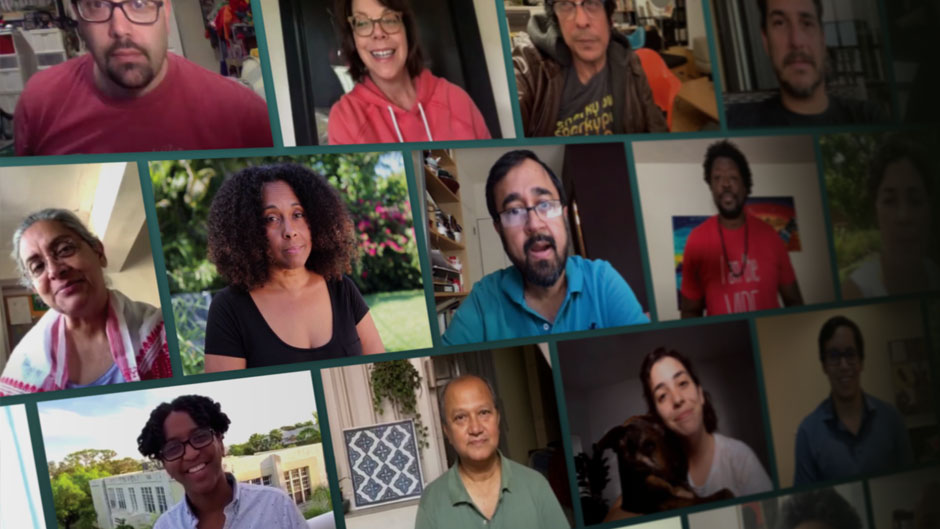Surya from Bangalore, India, hopes that post-pandemic, we will all strive to be more connected: with our loved ones, with our communities, with our colleagues.
“We need to do away with the capital ‘I’ in I and bring back the capital ‘E’ of Empathy,” he said. “I hope we can reconnect with our empathetic side.”
Cathleen from Miami, Florida, hopes that we “heed our scientists and visionaries and prepare effectively for the next crisis.”
Mark from New York City wants our society to “rebuild health care so that it serves all our people.”
These are some of the voices of a transmedia, or multiple media, storytelling project called “Sharing Our Dreams” that aims to capture the wishes of people from around the world for a post-pandemic future. Sponsored by the nonprofit multimedia organization Media for Change, the forum was conceived by Sanjeev Chatterjee, a professor in the University of Miami School of Communication. The multimedia project acknowledges that the COVID-19 pandemic was something that disrupted the world in unprecedented ways, but states that it will end one day. So, it is the perfect time to ask: “What kind of world do we want to build?” Chatterjee declared.
More than 35 video entries in several languages have been submitted to the website. “The goal was to ask people how they visualize the world and what the future will be like,” he said.
Media for Change is committed to building a community of media makers from all over the world with the belief that individual stories can eventually assemble a concerned audience and bring about change, according to Chatterjee.
Karin Wilkins, dean of the School of Communication, sits on the advisory board of the organization.
“Media for Change brings together a talented and enthusiastic collection of creative professionals and dedicated scholars committed to understanding how we can best use media for constructive social change,” said Wilkins. “The projects pursued represent some of the most significant concerns in our contemporary lives. They are challenging but nevertheless necessary to address.”
Among the teachers and storytellers also working on projects under the “Sharing Our Dreams” umbrella is Jeffrey Harlan, a Philadelphia schoolteacher who believes that “dreams can empower people.” Working with thousands of students in 43 states of the United States and in 38 countries, Harlan has begun dreamline, a classroom project, with other colleagues from around the world—where he encourages students to write their dreams on cloth banners. He has collected almost 3,000 banners.
As part of the “Sharing our Dreams” project, Chatterjee has also launched a podcast called “Where Dreams Come From,” which will feature several people who have followed their dreams and built a successful career.
The first podcast episode was an interview with Isaac Prilleltensky, vice provost for institutional culture at the University. Prilleltensky shared pieces of his life story, including the tragic loss of his parents when he was only 8 years old. He then was adopted by loving relatives in Argentina but had to face anti-Semitism and political strife.
“Growing up under difficult circumstances made me pursue my dreams,” he said. Those dreams included “fairness for everybody and wellness for all.” Prilleltensky devoted his life to that goal when he became a community psychologist and eventually implemented many of his teachings and beliefs in his work.
Others who will be interviewed for the podcast include Maggie Steber, an award-winning documentary photographer who has followed her passion, and Shahidul Alam, a photographer from Bangladesh whose work seeks to give a voice to the voiceless.
A parallel podcast in German, titled “Wo Träume Herkokken,” will be launched in the next few weeks, said Chatterjee.
Continuing the theme of dreams, Chatterjee has begun work on a documentary about the life of University of Miami alumnus Tvrtko Vujity, a Hungarian journalist who became a war correspondent and a well-known journalist in his country and in other Slavic language countries. His work led him to cover the genocide in Rwanda and report on the nuclear disaster at Chernobyl.
Chatterjee and Vujity met at the School of Communication when Vujity studied there. “I was eager to meet Tvrtko [again] after all these years because he was making a big change in his life’s trajectory,” said Chatterjee. Vujity had moved with his family to Hawaii and he told Chatterjee, “after telling the stories of hell on earth, now I want to discover paradise.”
For Chatterjee, Vujity’s journey could be attractive to many who hope to change their lives.
“This is potentially a story about reinvention, an evolution in the story of Tvrtko’s dream of becoming a journalist,” he said. “I think it could be a great story.”

